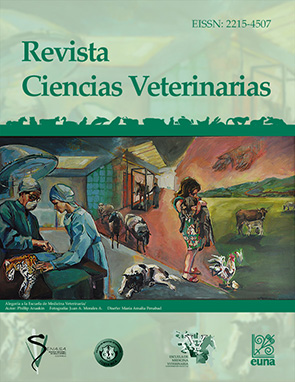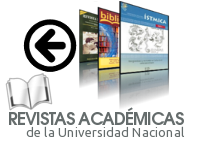Letter to the editor: It is erroneous to directly associate the detection of Helicobacter spp. with gastritis in canines
DOI:
https://doi.org/10.15359/rcv.35-2.1Keywords:
Helicobacter, gastritis, bacterial load, Helicobacter pyloriAbstract
It has been proposed that Helicobacter may play a significant role in the generation of gastritis and cancer in dogs. However, despite several independent efforts, there is still controversy regarding the true ability of Helicobacter to cause gastric lesions in these animals. The foregoing is due in part to the fact that gastritis is a multifactorial disease. Studies focused on naturally acquired infections have been unable to establish a positive correlation between Helicobacter colonization and gastritis. Establishing a clear association between the presence of Helicobacter and gastritis may be difficult due to the following reasons: (i) taxonomy of the genus Helicobacter remains unclear, (ii) virulence factors of Helicobacter species that colonize dogs are not well known, and (iii) simultaneous infections have been reported with several species of Helicobacter. Current knowledge in taxonomy and pathogenesis of Helicobacter species is insufficient to differentiate between pathogenic and non-pathogenic strains. Therefore, no direct association should be made between the detection of Helicobacter and gastritis.References
Amorim, I., Smet, A., Alves, O., Teixeira, S., Saraiva, A.L., Taulescu, M., Reis, C., Haesebrouck, F. & Gärtner, F. 2015. Presence and significance of Helicobacter spp. in the gastric mucosa of Portuguese dogs. Gut Pathog. 7: 12. doi:10.1186/s13099-015-0057-1
De Bock, M., Decostere, A., Hellemans, A., Haesebrouck, F. & Ducatelle, R. 2006. Helicobacter felis and Helicobacter bizzozeronii induce gastric parietal cell loss in Mongolian gerbils. Microbes Infect. 8 (2): 503–510. doi:10.1016/j.micinf.2005.08.003
Flahou, B., Van Deun, K., Pasmans, F., Smet, A., Volf, J., Rychlik, I., Ducatelle, R. & Haesebrouck, F. 2012. The local immune response of mice after Helicobacter suis infection: strain differences and distinction with Helicobacter pylori. Vet. Res. 43: 75. doi:10.1186/1297-9716-43-75
Harbour, S. & Sutton, P. 2008. Immunogenicity and pathogenicity of Helicobacter infections of veterinary animals. Vet. Immunol. Immunopathol. 122 (3-4): 191–203. doi:10.1016/j.vetimm.2007.12.003
Jergens, A.E., Pressel, M., Crandell, J., Morrison, J.A., Sorden, S.D., Haynes, J., Craven, M., Baumgart, M. & Simpson, K.W. 2009. Fluorescence In Situ Hybridization Confirms Clearance of Visible Helicobacter spp. Associated with Gastritis in Dogs and Cats. J. Vet. Intern. Med. 23: 16–23. doi: 10.1111/j.1939-1676.2008.0211.x
Joosten, M., Blaecher, C., Flahou, B., Ducatelle, R., Haesebrouck, F. & Smet, A. 2013. Diversity in bacterium-host interactions within the species Helicobacter heilmannii sensu stricto. Vet. Res. 44: 65. doi:10.1186/1297-9716-44-65
Joosten, M., Lindén, S., Rossi, M., Chin Yen Tay, A., Skoog, E., Padra, M., Peters, F., Perkins, T., Vandamme, P., Van Nieuwerburgh, F., D’Herde, K., Van den Broeck, W., Flahou, B., Deforce, D., Ducatelle, R., Marshall, B., Haesebrouck, F. & Smet, A. 2016. Divergence between the Highly Virulent Zoonotic Pathogen Helicobacter heilmannii and Its Closest Relative, the Low-Virulence “Helicobacter ailurogastricus” sp. nov. Infect. Immun. 84: 293–306. doi:10.1128/IAI.01300-15
Mitchell, H.M., Rocha, G.A., Kaakoush, N.O., O’Rourke, J.L. & Queiroz, D.M.M. 2014. The Family Helicobacteraceae. In: Rosenberger, E., DeLong, E.F., Lory, S., Stackebrandt, E. & Thompson, F. (Eds.). The Prokaryotes. Springer Berlin Heidelberg, Berlin, Heidelberg, pp. 337–392. doi:10.1007/978-3-642-39044-9_275
Suárez-Esquivel, M., Alfaro-Alarcón, A., Guzmán-Verri C. & Barquero-Calvo E. 2017. Analysis of the association between Helicobacter spp. burden and gastric lesions in dogs. Am J Vet Res. 78 (12). In press.
Downloads
Published
How to Cite
Issue
Section
License
Licensing of articles
All articles will be published under a license:

Licencia Creative Commons Atribución-NoComercial-SinDerivadas 3.0 Costa Rica.
Access to this journal is free of charge, only the article and the journal must be cited in full.
Intellectual property rights belong to the author. Once the article has been accepted for publication, the author assigns the reproduction rights to the Journal.
Ciencias Veterinarias Journal authorizes the printing of articles and photocopies for personal use. Also, the use for educational purposes is encouraged. Especially: institutions may create links to specific articles found in the journal's server in order to make up course packages, seminars or as instructional material.
The author may place a copy of the final version on his or her server, although it is recommended that a link be maintained to the journal's server where the original article is located.
Intellectual property violations are the responsibility of the author. The company or institution that provides access to the contents, either because it acts only as a transmitter of information (for example, Internet access providers) or because it offers public server services, is not responsible.







